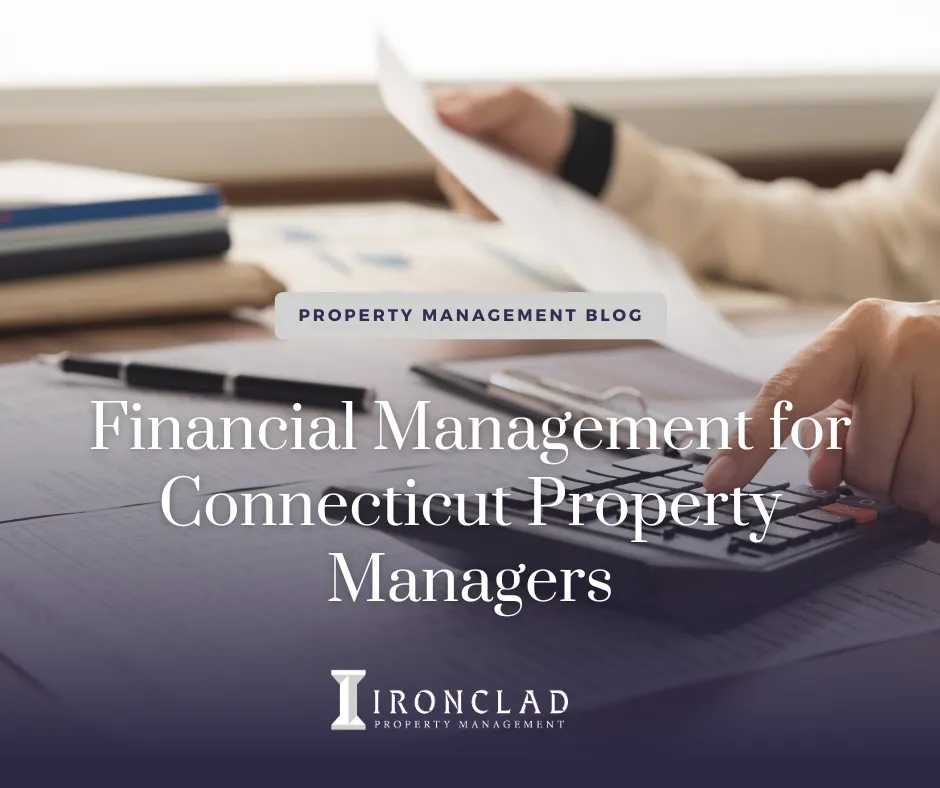
Financial Management for Connecticut Property Managers
Effective financial management is the cornerstone of successful property management. For property managers in Connecticut, mastering budgeting, rent collection, and financial reporting can lead to increased profitability and smoother operations. This guide outlines key strategies and best practices to help property managers optimize their financial management processes.
Budgeting and Financial Planning
A well-structured budget includes all anticipated income and expenses, helping property managers plan for both routine costs and unexpected expenditures. Key budget components include maintenance, repairs, utilities, property taxes, insurance, and management fees.
Forecasting Income and Expenses
Accurate forecasting involves analyzing past financial data and market trends to predict future income and expenses. Regularly updating forecasts helps in making informed decisions and adjusting strategies as needed.
Setting Financial Goals
Establishing clear financial goals, such as increasing net operating income (NOI) or reducing operating expenses, provides direction and motivation. Tracking progress towards these goals ensures that property management practices align with long-term financial objectives.
Implementing Efficient Rent Collection Systems
Utilizing online rent collection platforms can streamline the payment process for both tenants and property managers. Platforms like PayYourRent, Cozy, and Rentec Direct offer automated payment reminders, secure transactions, and detailed reporting.
Establishing Clear Payment Policies
Clear and consistent payment policies, including due dates, late fees, and acceptable payment methods, should be outlined in the lease agreement and communicated to tenants. This reduces misunderstandings and encourages timely payments.
Handling Late Payments and Delinquencies
Developing a protocol for handling late payments and delinquencies helps in maintaining cash flow and reducing financial stress. This may include sending reminders, charging late fees, and, if necessary, initiating eviction proceedings in compliance with Connecticut law.
Regular Financial Reports
Generating regular financial reports, such as income statements, balance sheets, and cash flow statements, provides a comprehensive view of the property’s financial health. These reports help property managers monitor performance and make informed decisions.
Using Property Management Software
Property management software like Buildium, AppFolio, and Yardi can automate financial reporting, track expenses, and provide real-time insights. These tools enhance accuracy and save time, allowing property managers to focus on strategic tasks.
Analyzing Financial Data
Regularly analyzing financial data helps identify trends, pinpoint areas for improvement, and assess the effectiveness of management strategies. Key performance indicators (KPIs) such as occupancy rates, collection rates, and expense ratios provide valuable insights.
Controlling Operating Expenses
Monitoring and controlling operating expenses is essential for maximizing profitability. This involves negotiating contracts with service providers, implementing cost-saving measures, and regularly reviewing expenses for potential savings.
Maintenance and Repair Costs
Proactive maintenance strategies can reduce repair costs by preventing major issues. Budgeting for routine maintenance and creating a reserve fund for unexpected repairs ensures that properties remain in good condition without financial strain.
Utility Management
Implementing energy-efficient practices and technologies can significantly reduce utility costs. Simple measures like using LED lighting, optimizing HVAC systems, and encouraging tenants to conserve energy can lead to substantial savings.
Tax Planning and Compliance
Staying informed about property tax assessments and appealing assessments when necessary can lead to significant savings. Property managers should regularly review assessments and ensure that they reflect the true value of the property.
Maximizing Tax Deductions
Property managers can maximize tax deductions by keeping detailed records of all expenses and ensuring that they are properly categorized. Deductions may include mortgage interest, depreciation, repairs, and professional services.
Staying Compliant with Tax Laws
Compliance with federal, state, and local tax laws is crucial to avoid penalties and legal issues. Consulting with a tax professional can help property managers navigate complex tax regulations and ensure timely and accurate filings.
Insurance and Risk Management
Having adequate property insurance coverage protects against financial loss due to damage, theft, or liability. Regularly reviewing and updating insurance policies ensures that coverage remains adequate as property values and risks change.
Risk Assessment and Mitigation
Conducting regular risk assessments helps identify potential hazards and vulnerabilities. Implementing risk mitigation measures, such as installing security systems, performing regular safety inspections, and addressing potential liabilities, can reduce the likelihood of costly incidents.
Financial Technology Integration
Integrating financial technology solutions into property management practices can enhance efficiency and accuracy. Fintech tools offer features like automated bookkeeping, digital wallets, and advanced analytics, making financial management more streamlined and effective.
Enhancing Tenant Payment Options
Offering multiple payment options, including credit cards, ACH transfers, and mobile payments, makes it easier for tenants to pay rent on time. This convenience can improve collection rates and tenant satisfaction.
Effective financial management is crucial for property managers in Connecticut to ensure profitability and smooth operations. By implementing robust budgeting, rent collection, and financial reporting practices, property managers can achieve their financial goals and maintain successful property management operations.